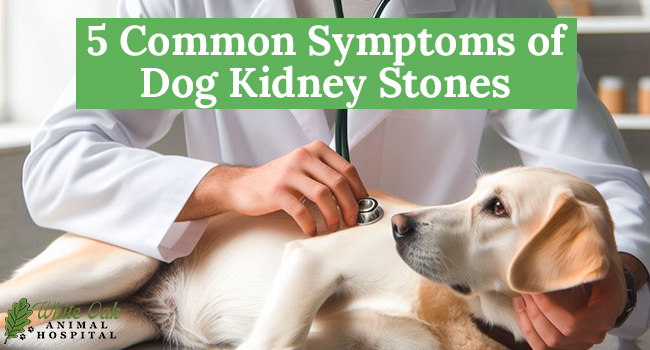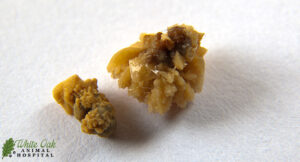
Dog kidney stones, or renal calculi, are a common concern among pet owners. These small, hard mineral deposits can form in the kidneys of dogs, leading to various health complications if left unchecked. Recognizing the symptoms of dog kidney stones early on is crucial for prompt intervention and effective management.
Failure to address these symptoms promptly can result in discomfort for your furry friend and may even lead to more severe health issues. Therefore, as responsible pet owners, we must familiarize ourselves with the signs of dog kidney stones. By staying vigilant and proactive, we can ensure the well-being and longevity of our beloved canine companions.
What Are Dog Kidney Stones?
 Dog kidney stones are solid mineral deposits that can develop within the kidneys of our canine companions. These stones vary in size and composition, with common types including calcium oxalate and struvite stones. The formation of dog kidney stones can occur due to various factors, including diet, genetics, and underlying medical conditions.
Dog kidney stones are solid mineral deposits that can develop within the kidneys of our canine companions. These stones vary in size and composition, with common types including calcium oxalate and struvite stones. The formation of dog kidney stones can occur due to various factors, including diet, genetics, and underlying medical conditions.
For instance, diets high in certain minerals like calcium or phosphorus may predispose dogs to stone formation. Additionally, inadequate hydration and urinary tract infections can contribute to developing kidney stones in dogs.
Understanding the causes behind dog kidney stone formation is essential for effectively implementing preventive measures and managing the condition. By addressing underlying factors and making appropriate dietary adjustments, pet owners can help reduce the risk of kidney stone formation in their furry companions.
Understanding the Importance of Recognition
 Early detection of dog kidney stones is paramount for ensuring the well-being of our furry companions. By promptly recognizing kidney stones’ symptoms, pet owners can seek timely veterinary care, leading to more effective treatment outcomes. Failure to address dog kidney stones promptly can result in various risks and complications for our beloved pets.
Early detection of dog kidney stones is paramount for ensuring the well-being of our furry companions. By promptly recognizing kidney stones’ symptoms, pet owners can seek timely veterinary care, leading to more effective treatment outcomes. Failure to address dog kidney stones promptly can result in various risks and complications for our beloved pets.
These may include persistent discomfort, urinary tract infections, and kidney damage. Left untreated, kidney stones can lead to serious health issues that significantly impact the quality of life for dogs. Therefore, as responsible pet owners, we must remain vigilant and proactive in monitoring our pets for any signs of discomfort or changes in urinary habits. Early recognition and intervention can make a significant difference in managing dog kidney stones and ensuring our canine companions’ overall health and happiness.
The 5 Common Symptoms of Dog Kidney Stones
 Frequent Urination and Changes in Urine
Frequent Urination and Changes in Urine
Dogs with kidney stones may exhibit increased frequency of urination, often accompanied by noticeable changes in urine color or consistency. Pet owners may observe their dogs urinating more frequently than usual or having accidents indoors. Additionally, the urine may appear cloudy, bloody, or have a strong odor.
Painful Urination or Difficulty Urinating
Dogs experiencing kidney stones may show signs of discomfort or pain while urinating. This discomfort can manifest as whining, whimpering, or reluctance to urinate. Some dogs may also exhibit straining or difficulty passing urine, indicating obstruction caused by kidney stones within the urinary tract.
Blood in Urine (Hematuria)
Hematuria, or blood in the urine, is a common symptom of dog kidney stones. Pet owners may notice pink, red, or brown discoloration in their dog’s urine, indicating the presence of blood. Hematuria can occur intermittently or persistently, depending on the severity of the kidney stone condition.
 Lethargy and Decreased Activity Levels
Lethargy and Decreased Activity Levels
Dogs with kidney stones may experience lethargy, fatigue, or lack of energy. They may seem less interested in activities they previously enjoyed and may exhibit reluctance to engage in physical exercise. Lethargy and decreased activity levels can indicate underlying discomfort or pain associated with kidney stones.
Changes in Appetite and Weight Loss
 Kidney stones can also affect a dog’s appetite and eating habits. Pet owners may notice changes in their dog’s appetite, such as decreased food intake or loss of interest in meals. Additionally, dogs with kidney stones may experience weight loss despite maintaining their regular diet. These changes in appetite and weight can be attributed to discomfort, nausea, or digestive issues related to kidney stone formation.
Kidney stones can also affect a dog’s appetite and eating habits. Pet owners may notice changes in their dog’s appetite, such as decreased food intake or loss of interest in meals. Additionally, dogs with kidney stones may experience weight loss despite maintaining their regular diet. These changes in appetite and weight can be attributed to discomfort, nausea, or digestive issues related to kidney stone formation.
Pet owners must recognize the common symptoms of dog kidney stones to ensure timely diagnosis and treatment. If you observe any of the mentioned symptoms in your dog, you must consult a veterinarian promptly for proper evaluation and management. Early intervention can help alleviate discomfort, prevent complications, and improve your canine companion’s overall quality of life.
Seeking Veterinary Care
 When addressing concerns about dog kidney stones, consulting a veterinarian is of utmost importance for pet owners. Veterinary professionals possess the expertise and resources to accurately diagnose and effectively treat this condition in dogs. Upon suspecting the presence of kidney stones, veterinarians may recommend diagnostic procedures to confirm the diagnosis.
When addressing concerns about dog kidney stones, consulting a veterinarian is of utmost importance for pet owners. Veterinary professionals possess the expertise and resources to accurately diagnose and effectively treat this condition in dogs. Upon suspecting the presence of kidney stones, veterinarians may recommend diagnostic procedures to confirm the diagnosis.
These procedures may include urine analysis, blood tests, imaging studies such as X-rays or ultrasounds, and, in some cases, more specialized tests like a urine culture or stone analysis. Through these diagnostic measures, veterinarians can accurately assess the severity of the dog’s kidney stone condition and develop a tailored treatment plan accordingly. Pet owners should prioritize seeking veterinary care at the earliest signs of symptoms to ensure their dog’s health and well-being are appropriately addressed.
Treatment Options
Treatment options for dog kidney stones encompass a variety of approaches aimed at managing the condition effectively and improving the quality of life for our furry companions. In less severe cases, veterinarians may prescribe medications or herbal formulas to alleviate symptoms and help dissolve smaller kidney stones. Additionally, dietary changes may be recommended to modify the dog’s nutrition and prevent further stone formation.
However, in more severe cases or instances where conservative measures prove ineffective, surgical intervention may be necessary to remove large or obstructive kidney stones. Surgical procedures may include lithotripsy to break up stones using sound waves or surgical removal of stones through minimally invasive techniques. Furthermore, preventive measures are crucial in reducing the likelihood of kidney stone recurrence in dogs.
These may include ensuring adequate hydration, feeding a balanced diet, and regular veterinary check-ups to monitor the dog’s urinary health. By implementing these treatment options and preventive measures, pet owners can help manage dog kidney stones effectively and promote their pet’s overall well-being.
 When dealing with concerns about dog kidney stones, seeking veterinary care is essential. We encourage you to consider White Oak Animal Hospital for comprehensive and specialized assistance. At White Oak Animal Hospital, you’ll find integrative treatment options unavailable elsewhere, with TCVM Telemedicine consultations offered for your convenience. With over 28 years of experience, you can trust their expertise in addressing your pet’s needs.
When dealing with concerns about dog kidney stones, seeking veterinary care is essential. We encourage you to consider White Oak Animal Hospital for comprehensive and specialized assistance. At White Oak Animal Hospital, you’ll find integrative treatment options unavailable elsewhere, with TCVM Telemedicine consultations offered for your convenience. With over 28 years of experience, you can trust their expertise in addressing your pet’s needs.
Additionally, we’re excited to offer you a valuable resource: the Dog Bladder & Kidney Stones eBook. Co-authored by Dr. Damron, this eBook provides valuable insights into understanding, preventing, and managing kidney stones in dogs. It covers symptoms, treatments, and preventive measures, empowering you to make informed decisions about your pet’s health.
Frequently Asked Questions
Can dog kidney stones be prevented?
Yes, dog kidney stones can often be prevented with proper management. This includes ensuring your dog stays hydrated, feeding a balanced diet low in certain minerals, and scheduling regular veterinary check-ups to monitor urinary health.
Are all kidney stones in dogs the same?
No, kidney stones in dogs can vary in composition and size. Common types include calcium oxalate and struvite stones, each requiring specific treatment approaches based on composition.
How are dog kidney stones diagnosed?
Dog kidney stones are diagnosed through various diagnostic procedures, including urine analysis, blood tests, and imaging studies such as X-rays or ultrasounds. Your veterinarian will recommend the most appropriate tests based on your dog’s symptoms and medical history.
Can dog kidney stones dissolve on their own?
Sometimes, small dog kidney stones may dissolve independently with proper hydration and dietary management. However, larger or obstructive stones may require medical intervention such as medication or surgery.
Is surgery the only option for treating dog kidney stones?
Surgery is not always the only option for treating dog kidney stones. Depending on the size and composition of the rocks, veterinarians may recommend medication, dietary changes, or minimally invasive procedures like lithotripsy to break up the stones.
Related Posts
-
Effective Relief For Allergic Dog Symptoms
An allergic dog is easy to spot! Sure, all dogs itch and scratch, but you…
-
5 Signs of Dog Cancer: Spotting Symptoms and Debunking Myths and Misconceptions
Dog cancer is, unfortunately, a prevalent concern among canine companions. It affects a significant number…
-
10 Risk Factors for Dog Skin Cancer Every Owner Should Know
Dog skin cancer is a matter of considerable concern for pet owners, notwithstanding the…
-
5 Common Causes of Dog Limping on the Back Leg: A Comprehensive Guide
A dog limping on the back leg is a concerning and prevalent issue among pet…










